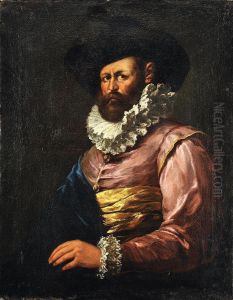Victor Boucquet Paintings
Victor Boucquet, also known as Victor Boucq or Boucquet, was a Flemish painter born in Veurne (Furnes), in the County of Flanders, in 1619. He was a prominent artist of his time, known for his skill in creating historical and religious paintings. Boucquet's work was marked by a strong influence from the great Flemish Baroque tradition, and his paintings often contained dramatic lighting, rich colors, and intense emotion, characteristic of the Baroque style.
Boucquet was trained by the Flemish painter Gaspar de Crayer, who was a respected artist in his own right and a contemporary of Peter Paul Rubens. Under de Crayer's mentorship, Boucquet developed a firm grasp of the techniques and themes popular among Flemish artists of the 17th century. His time as an apprentice was crucial in shaping his later work, which would come to be celebrated for its expressive figures and attention to detail.
Despite his Flemish roots, Boucquet's work did not remain confined to his homeland. His talent was recognized beyond the borders of Flanders, and he received commissions from abroad, which contributed to his reputation as a skilled painter of religious narratives and portraits. His clientele included various religious institutions and private patrons who sought his expertise for altarpieces, devotional images, and personal likenesses.
Victor Boucquet's career was relatively short-lived, yet productive. He became a master in the Guild of Saint Luke in Veurne in 1643, which marked his official recognition as a professional artist. Throughout his career, Boucquet remained active in his local artistic community, contributing to the cultural life of Veurne and the surrounding regions.
Boucquet died in 1677, in Veurne. While his works might not be as widely recognized today as those of some of his contemporaries, his contributions to Flemish art during the Baroque period remain significant. His paintings can still be seen in various churches and museums, offering a glimpse into the religious and aesthetic sensibilities of the 17th century. Boucquet's legacy is that of a skilled painter who embodied the vibrant artistic spirit of his time and left behind a body of work that continues to be appreciated for its craftsmanship and emotional power.
